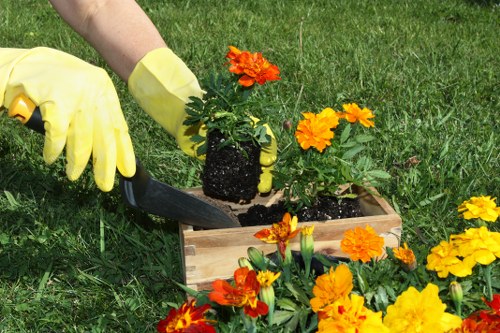Effective Oil Stain Removal for Driveways in Bedford Park

Oil stains on driveways not only look unsightly but can also cause long-term damage to your pavement. Whether you’re dealing with a fresh spill or a stubborn old stain, knowing how to effectively remove oil from your Bedford Park driveway is essential.
In Bedford Park, harsh weather conditions can exacerbate oil stains, making them harder to remove if not treated promptly. This guide will help you understand the best practices for oil stain removal, ensuring your driveway remains clean and well-maintained.
Understanding the nature of oil stains is the first step in tackling them effectively. Different types of oils and surfaces may require specific cleaning methods.
Understanding Oil Stains on Driveways

Oil stains on driveways are typically caused by accidental spills from vehicles, machinery, or construction activities. The porous nature of common driveway materials such as asphalt and concrete allows oil to seep in, making stains difficult to remove.
Over time, oil stains can deteriorate the driveway surface, leading to cracks and other forms of damage. Addressing oil spills promptly can prevent costly repairs in the future.
There are various types of oils that can cause stains, including motor oil, cooking oil, and petroleum-based products. Each type requires a slightly different approach for effective removal.
Common Causes of Oil Stains

- Vehicle leaks or spills
- Improper disposal of cooking oils
- Construction equipment leaks
- Industrial activities
Identifying the source of the oil stain can help in selecting the appropriate removal method. For example, motor oil might require stronger solvents compared to cooking oil.
Regular monitoring of your driveway can help catch oil spills early, reducing the severity of stains and making them easier to clean.
Why Timely Removal is Essential

Immediate attention to oil spills prevents the oil from penetrating deeper into the driveway material. The longer oil sits, the more it soaks in, making it nearly impossible to remove completely.
Timely removal also maintains the aesthetic appeal of your property. A clean driveway enhances curb appeal and can positively impact property value.
Additionally, oil spills can create slippery surfaces, posing safety hazards for pedestrians and vehicles alike.
Effective Methods for Oil Stain Removal

There are several methods to remove oil stains from driveways, ranging from DIY solutions to professional services. Choosing the right method depends on the severity of the stain and your personal preferences.
DIY methods are cost-effective and can be highly efficient for fresh or minor stains. Professional services, on the other hand, offer thorough cleaning for stubborn or extensive oil spills.
It’s important to assess the extent of the oil stain before deciding which removal method to use.
DIY Solutions

- Baking Soda: Absorbs oil and makes it easier to scrub away.
- Dish Soap: Breaks down oil molecules for effective cleaning.
- Cat Litter: Absorbs large amounts of oil from the surface.
- Vinegar: Helps to neutralize oil stains.
Using household items for oil stain removal can be an eco-friendly and economical approach.
Here’s a simple DIY method to tackle oil stains:
Professional Cleaning Services

For severe or persistent oil stains, hiring a professional cleaning service in Bedford Park can ensure thorough removal. Professionals use specialized equipment and cleaning agents that are more effective than standard DIY methods.
While professional services may come at a higher cost, the results are often more durable and long-lasting, saving you time and effort in the long run.
When choosing a professional service, consider factors such as reputation, customer reviews, and the specific cleaning techniques they employ.
Step-by-Step Guide to Removing Oil Stains

Removing an oil stain involves several steps to ensure complete cleaning and prevent future damage to your driveway.
Having the right tools and following a systematic approach can make the process more manageable and effective.
Below is a detailed step-by-step guide:
Tools and Materials Needed

- Baking soda or kitty litter
- Dish soap
- Stiff-bristled brush
- Hot water
- Bucket
- Protective gloves
Gathering all necessary tools before starting can streamline the cleaning process.
Using the right materials ensures that you can tackle the oil stain effectively without damaging the driveway surface.
Preparation Steps

Begin by removing any excess oil from the driveway using paper towels or a cloth. Avoid spreading the oil further.
Next, cover the oil stain with an absorbent material like baking soda or kitty litter. Let it sit for at least 30 minutes to absorb the oil.
After absorption, sweep away the material using a stiff-bristled brush.
Detailed Cleaning Process

Mix dish soap with hot water in a bucket to create a soapy solution. Apply this mixture to the oil stain, ensuring it is thoroughly saturated.
Use the stiff-bristled brush to scrub the area in circular motions. This helps to break down the oil and lift it from the driveway surface.
Rinse the area with clean water, ensuring all soap residue is removed. Repeat the process if necessary for stubborn stains.
Preventing Future Oil Stains

Preventing oil stains is easier than removing them. Regular maintenance and mindful practices can keep your driveway clean and stain-free.
Implementing preventive measures not only maintains the appearance of your driveway but also extends its lifespan.
Here are some tips to prevent oil stains:
Regular Maintenance Tips

- Clean up spills immediately
- Use drip trays under vehicles
- Seal your driveway periodically
- Regularly sweep and wash your driveway
Keeping your driveway sealed can act as a protective barrier against oil penetration.
Regular sweeping helps to remove debris that can trap oil and prevent proper absorption.
Choosing the Right Solution for Your Driveway

Deciding between DIY methods and professional services depends on various factors, including the size of the stain, your budget, and your availability.
For small to medium stains, DIY solutions are often sufficient. However, large or deeply set stains may require professional intervention.
Consider the long-term implications of each method to make an informed decision that best suits your needs.
Local Expertise: Oil Stain Removal in Bedford Park and Surrounding Areas

Bedford Park is surrounded by several neighborhoods that share similar challenges with oil stain removal. Here are the closest areas where residents can also benefit from effective oil stain removal services:
- South River: Known for its scenic views and residential streets, South River residents prioritize driveway maintenance.
- Browns Yard: A bustling area where businesses and homes alike may encounter oil stains frequently.
- Northwood: With its mix of homes and light industry, Northwood faces unique oil stain challenges.
- Greenfield: A family-friendly neighborhood that values clean and safe driveways.
- Lakeview: Proximity to water bodies means quick action is needed to prevent oil runoff.
- Maple Heights: Residential area with a focus on maintaining property aesthetics.
- Riverside: Industrial activities nearby contribute to occasional oil spills.
- Willow Creek: Offers both DIY enthusiasts and professional service options for oil stain removal.
- Oak Grove: Historic homes with paved driveways require careful cleaning methods.
- Pine Hills: A blend of commercial and residential properties needing versatile cleaning solutions.
- Sunnybrook: Emphasizes eco-friendly cleaning practices for driveway maintenance.
- Elm Street: Central location with easy access to professional cleaning services.
- Riverdale: A community that often relies on local experts for driveway care.
- Brookside: Beautiful landscapes that benefit from regular driveway cleaning to enhance curb appeal.
Each of these areas has unique characteristics that influence the oil stain removal approach, making local expertise invaluable.
Choosing a service provider familiar with the specific needs of Bedford Park and its neighboring regions ensures the best results.
Frequently Asked Questions

1. How soon should I address an oil stain on my driveway?
It’s best to address oil stains as soon as possible. Prompt removal prevents the oil from seeping deeper into the driveway material, making it easier to clean and less likely to cause damage.
2. Can I use the same method for different types of oil stains?
While many oil stains can be treated with similar methods, some may require specific approaches. For instance, motor oil might need stronger cleaning agents compared to cooking oil. Identifying the type of oil helps in selecting the most effective removal method.
3. Are there eco-friendly solutions for oil stain removal?
Yes, there are several eco-friendly solutions such as using baking soda, vinegar, and eco-friendly dish soaps. These alternatives are effective in breaking down oil stains without harming the environment.
4. When should I consider hiring a professional for oil stain removal?
If the oil stain is large, deeply embedded, or has been there for an extended period, hiring a professional is advisable. Professionals have access to specialized equipment and cleaning agents that can handle stubborn stains more effectively.
5. How can I prevent oil stains from recurring on my driveway?
Regular maintenance, such as sealing your driveway, promptly cleaning spills, and using drip trays for vehicles, can significantly reduce the likelihood of oil stains recurring. Additionally, being mindful of where you park and ensuring vehicles are in good condition can prevent leaks.


